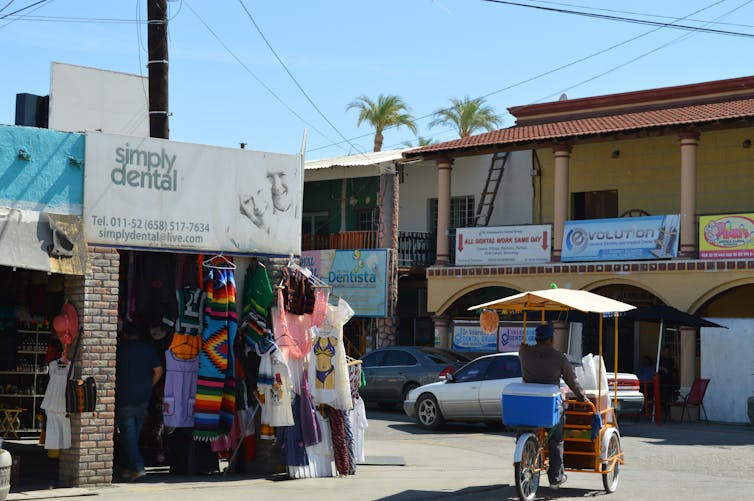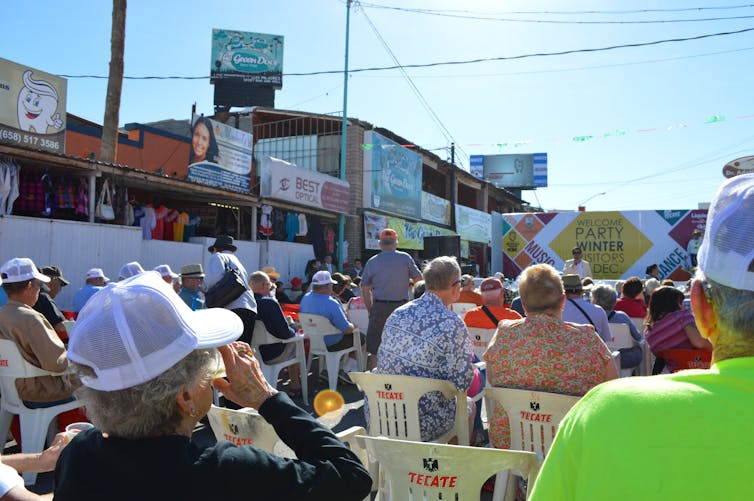How Canadian dental tourism exploits Mexican workers
Poor working conditions and discriminatory practices in Mexican dental clinics suggest the need for global regulation of medical tourism, says Krystyna Adams
Share

This piece first appeared at The Conversation.
The town of Los Algodones in Mexico is nicknamed “Molar City”. It has a population of just 6,000 people and, shockingly, it has more than 500 practising dentists. This has produced an intense clustering of dental clinics within a four block radius.
Many of these dentists chose to work in this town because of the tourist traffic, given its proximity to the Mexico-United States border. Thousands of Canadian and American tourists park their cars and walk across the border into Los Algodones to spend the day souvenir shopping, eating and drinking in the local restaurants, and purchasing alcohol, prescription drugs and dental care at lower costs than available back home.
In 2015 and 2016, I spent four months living in Los Algodones conducting interviews and participating in local events for a doctoral research project in health sciences at Simon Fraser University. My work investigates dental travel as part of the wider phenomenon of “medical tourism” — an industry that is growing rapidly as more and more patients seek access to new or more affordable medical treatments outside of their countries of residence.
My research raises concerns about exploitative industry practices in Los Algodones, Mexico. These include poor working conditions and discriminatory practices for employees in dental clinics, harassment of Indigenous street vendors and lack of access to dental care for local residents.
Inside ‘Molar City’
Most of the residents and employees I met during my research in Los Algdones were grateful for the much-needed economic benefits of the dental tourism industry. But I also heard concerns and frustrations from members of the local population. They felt that many of the industry activities were unfair and difficult to change.
One interviewee explained how dental tourists often come with prejudiced assumptions about Mexico, stating: “We see a lot of racism […] people trying to come here and saying, okay it is Mexico, I can ask for anything and pay you less.”

(Krystyna Adams), Author provided
Local residents and industry employees felt that dental tourists’ perceptions of Mexico as unsafe and underdeveloped are driving poor working conditions and discriminatory practices.
For example, employees work long hours to promote Los Algodones’ reputation for their employers as an ideal site to purchase dental care. Some also said they had experienced harassment from dental tourists negotiating lower prices and faster care.
Harassment of Indigenous vendors
Clinic employees and local residents also experience stressful interactions in the industry to meet the expectations of clinic owners. Some owners encourage employees to minimize their Mexican accents. This is done to distance Los Algodones from prejudiced perceptions of Mexico as an underdeveloped place with inferior medical care.
One participant described how a dental clinic owner offered to pay him to dump buckets of water on the heads of Indigenous souvenir vendors working near his clinic. Along with harassment, clinic owners also encourage Indigenous vendors to “stay cool, sell stuff cheap, and smile to people.” Many owners worry that the presence of Indigenous vendors might deter tourists by representing the underdeveloped Mexico of tourists’ imaginations.

(Krystyna Adams), Author provided
Local residents struggle to access dental care
My research also revealed that dental clinic owners’ concerns about reputation can decrease access to dental care for local residents. Clinic owners suggested they’re too busy marketing their services and treating foreign patients to treat many locals. Some owners are using free X-rays to entice tourists, who shop around for their ideal care.
Most of the dental services in Los Algodones are also focused on the provision of major restorative treatment rather than preventative care, given the needs of dental tourists. Most local residents cannot afford this type of care. This is concerning as there are limited publicly funded dental care options available in this region of Mexico.
Overall, the “dental Shangri-la of the Mexican desert” is only an oasis for those able and willing to travel and pay for dental care. For many, the industry provides much-needed employment. But this might be stressful, unfair work for individuals unable to use the dental oasis for their own health needs.
The need for global regulation
Participation in the global medical tourism industry is increasing and research shows that this growth raises serious ethical challenges, at least in the industry’s current form. Researchers have raised concerns about the negative impacts on the health of local people who live and work in these medical tourism destinations.
My in-depth investigation of industry practices in the town of Los Algodones provides more evidence to support these concerns. It suggests the need for better global regulation of dental tourism and medical tourism more widely.
This regulation is needed to avoid competition between industry sites driving down labour standards in the global industry and diverting health resources away from populations in need. This regulation could enforce acceptable work conditions to avoid a race-to-the-bottom effect as industry sites try to attract customers to lower-cost, desirable medical care.
More information about these concerns could also help individuals participating in the industry to avoid harmful practices. It could remind medical tourists that cost savings for care might come at a cost to fair labour standards — and that they should allow sufficient time for treatment and be prepared to pay fair prices.
Krystyna Adams, Doctoral student in Health Sciences and SFU Medical Tourism Research Group, Simon Fraser University